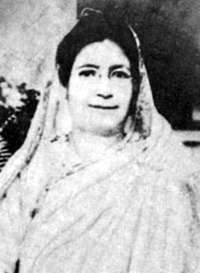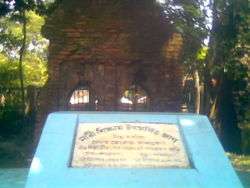Begum Rokeya
 Begum Rokeya | |
| Born |
Roquia Khatun 9 December 1880 Pairabondh Village, Mithapukur Upazila, Rangpur, Bengal Presidency, British Indian Empire (modern Bangladesh) |
| Died |
9 December 1932 (aged 52) Kolkata, Bengal Presidency, British India (modern India) |
| Occupation | Social worker, writer, Muslim feminist |
| Language | Bangla |
| Nationality | Indian |
| Ethnicity | Bengali |
| Citizenship | British subject |
| Period | British Rule |
| Literary movement | Women's Rights |
| Notable works | Sultana's Dream, Padmarag |
| Spouse | Khan Bahadur Sakhawat Hussain |
Begum Rokeya Sakhawat Hossain, popularly known as Begum Rokeya (9 December 1880 – 9 December 1932), was a leading feminist writer and social worker in undivided Bengal during the early 20th century. She is most famous for her efforts on behalf of gender equality and other social issues.[1] She established the first school aimed primarily at Muslim girls, which still exists today. She was a notable Muslim feminist; Begum Rokeya also wrote short stories and novels. Her important works are Sultana's Dream and Padmarag.
Life

Rokeya Khatun was born in 1880 in the village of Pairabondh, Mithapukur, Rangpur, present Bangladesh, in what was then the British Indian Empire. Her father, Jahiruddin Muhammad Abu Ali Haidar Saber, was a highly educated zamindar (landlord) who married four times; his marriage to Rahatunnessa resulted in the birth od Rokeya, who had two sisters and three brothers, one of whom died in childhood. Rokeya's eldest brother Ibrahim Saber, and her immediate elder sister Karimunnesa, both had great influence on her life. Karimunnesa wanted to study Bengali, the language of the majority in Bengal. The family disliked this because many upper class Muslims of the time preferred to use Arabic and Persian as the media of education, instead of their native language, Bengali. Ibrahim taught English and Bengali to Rokeya and Karimunnesa; both sisters became authors.
Karimunnesa married at the age of fourteen, later earning a reputation as a poet. Both of her sons, Nawab Abdul Karim Gaznawi and Nawab Abdul Halim Gaznawi, became famous in the political arena and occupied ministerial portfolios under British authorities.
Rokeya married at the age of sixteen in 1896. Her Urdu-speaking husband, Khan Bahadur Sakhawat Hussain, was the deputy magistrate of Bhagalpur, which is now a district under the Indian state of Bihar. He married earlier also. Sakhawat was then 38 years old before his marriage with Rokeya. Sakhawat did his B.A.G. from England and was a member of Royal Agricultural Society of England. He married Rokeya after the death of his first wife. As he was gentle, liberal-minded and had much interest in female education he encouraged Rokeya to continue her brother's work by encouraging her to keep learning Bengali and English. He also suggested that she write, and on his advice she adopted Bengali as the principal language for her literary works because it was the language of the masses. She launched her literary career in 1902 with a Bengali essay entitled Pipasa (Thirst). She also published the books Motichur (1905) and Sultana's Dream (1908) during her husband's lifetime.
In 1909, Sakhawat Hussain died. He had encouraged his wife to set aside money to start a school primarily for Muslim women. Five months after his death, Rokeya established a high school in her beloved husband's memory, naming it Sakhawat Memorial Girls' High School.[2] It started in Bhagalpur, a traditionally Urdu-speaking area, with only five students. A dispute with her husband's family over property forced her to move the school in 1911 to Calcutta, a Bengali-speaking area.[2] It remains one of the city's most popular schools for girls and is now run by the state government of West Bengal.

Rokeya also founded the Anjuman e Khawateen e Islam (Islamic Women's Association), which was active in holding debates and conferences regarding the status of women and education. She advocated reform, particularly for women, and believed that parochialism and excessive conservatism were principally responsible for the relatively slow development of Muslims in British India. As such, she is one of the first Islamic feminists. She was inspired by the traditional Islamic learning as enunciated in the Qur'an, and believed that modern Islam had been distorted or corrupted; Anjuman e Khawateen e Islam organised many events for social reforms based on the original teachings of Islam that, according to her, were lost.
Rokeya remained busy with the school, the association, and her writings for the rest of her life. She died of heart problems on 9 December 1932, which was her 52nd birthday. In Bangladesh, 9 December is celebrated as Rokeya Day.
Rokeya's grave in Sodepur was rediscovered due to the efforts of the historian Amalendu De.[3]

Works
| Library resources about Begum Rokeya |
| By Begum Rokeya |
|---|
- Pipasha ("Thirst", 1902).
- Motichur (essays, 1st vol. 1904, 2nd vol. 1922). The second volume of Matichur includes stories and fairy tales such as Saurajagat (The Solar System), Delicia Hatya (translation of the Murder of Delicia, by Mary Corelli), Jvan-phal (The Fruit of Knowledge), Nari-Sristi (Creation of Women), Nurse Nelly, Mukti-phal (The Fruit of Emancipation), etc.
- Sultana's Dream, (satire, 1908) a notable early work of feminist science fiction involving a utopian male/female role-reversal. It is a satirical piece, a feminist utopia, set in a place called Lady Land, a world ruled by women. Later translated as Sultanar Swopno.[4]
- Saogat (1918, poetry). Her poem titled ‘Saogat’ was published on the first page of the first issue of the Saogat in Agrahayan.
- Padmarag ("Essence of the Lotus", novel, 1924). A feminist utopia.
- Oborodhbashini ("The Secluded Women", 1931)
- Boligarto (short story).
- Narir Adhikar ("The Rights of Women"), an unfinished essay for the Islamic Women's Association
- God Gives, Man Robs, 1927, republished in God gives, man robs and other writings, Dhaka, Narigrantha Prabartana, 2002
- Education Ideals for the Modern Indian Girl, 1931, republished in Rokeya Rachanabali, Abdul Quadir (editor), Dhaka, Bangla Academy, 2006
Begum Rokeya wrote in a number of genres, short stories, poems, essays, novels and satirical writings, developing a distinctive literary style, characterised by creativity, logic and a wry sense of humour. She started writing in the Nabanoor from about 1903, under the name of Mrs. R S Hossain. However, there is an opinion that her first published writing Pipasha appeared in the Nabaprabha in 1902. She wrote regularly for the Saogat, Mahammadi, Nabaprabha, Mahila, Bharatmahila, Al-Eslam, Nawroz, Mahe-Nao, Bangiya Mussalman Sahitya Patrika, The Mussalman, Indian Ladies Magazine, etc. Her writings called upon women to protest against injustices and break the social barriers that discriminated against them.
References
- ↑ Akhter, Shahida (2012). "Hossain, Roquiah Sakhawat". In Islam, Sirajul; Jamal, Ahmed A. Banglapedia: National Encyclopedia of Bangladesh (Second ed.). Asiatic Society of Bangladesh.Administrator. "Roquia Sakhawat Hussain (Begum Rokeya)". Londoni.
- 1 2 Dr. Barnita Bagchi (1 October 2003). "Rokeya Sakhawat Hossain". Retrieved 2010-05-16.
- ↑ Banerjee, Pranotosh (27 May 2014). "Remembering Historian Amalendu De". Janoswartho Barta. Chatterjee, Garga (trans.). Retrieved 2016-01-13.
- ↑ "Strange Horizons Reviews: Sultana's Dream by Rokeya Sakhawat Hossain, reviewed by Aishwarya Subramanian". strangehorizons.com.
External links
| Wikimedia Commons has media related to Roquia Sakhawat Hussain. |
- Hasan, Md. Mahmudul (2012). Marginalisation of Muslim writers in South Asian literature: Rokeya Sakhawat Hossain's English works (PDF). South Asia Research, 32 (3) (Print) 1741-3141 (Online). pp. 179–197. ISSN 0262-7280.
- "Asiatic (see articles on Rokeya in 7.2 (December 2013) issue of the journal)". journals.iium.edu.my/asiatic.
- The Essential Rokeya: Selected Works of Rokeya Sakhawat Hossain. Leiden, Boston: Brill Publishing. 2013. http://www.brill.com/essential-rokeya
|
The relevance of Rokeya's legacy, available at http://www.thedailystar.net/the-relevance-of-rokeyas-legacy-54252
Journey through the world of Rokeya, available at http://newagebd.net/74741/journey-through-the-world-of-rokeya/